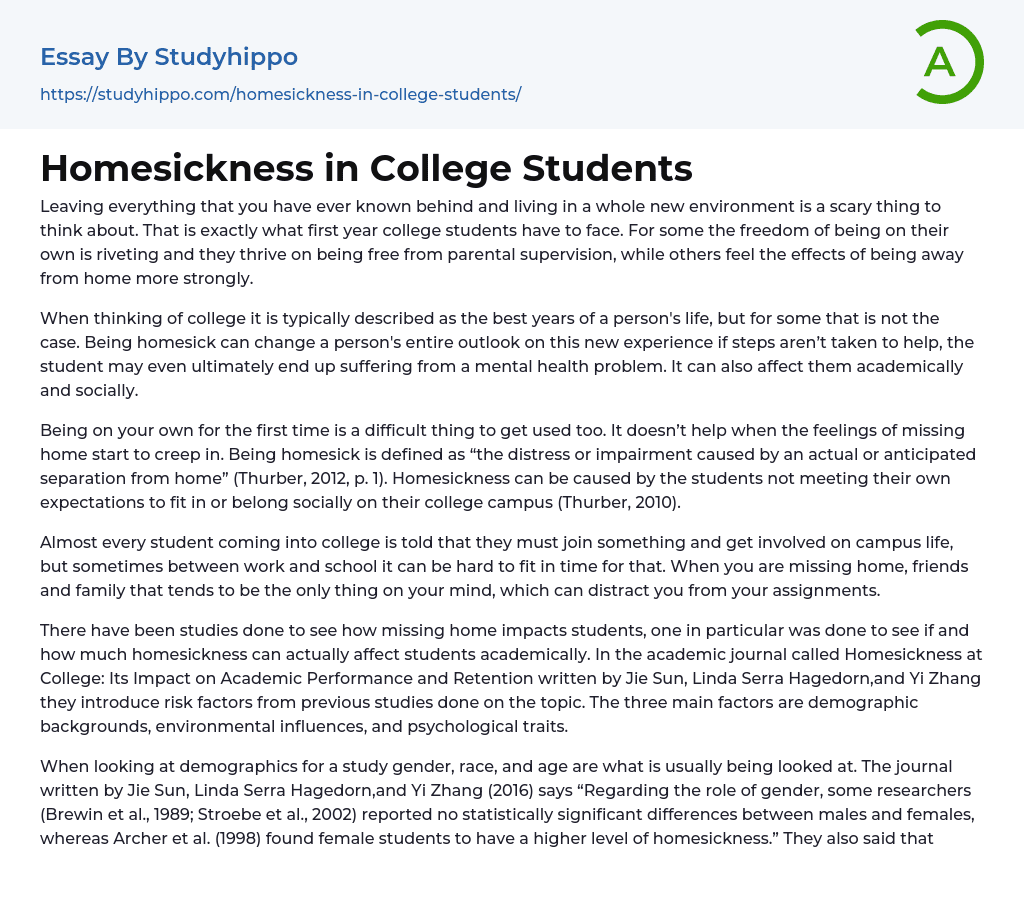Leaving everything that you have ever known behind and living in a whole new environment is a scary thing to think about. That is exactly what first year college students have to face. For some the freedom of being on their own is riveting and they thrive on being free from parental supervision, while others feel the effects of being away from home more strongly.
When thinking of college it is typically described as the best years of a person's life, but for some that is not the case. Being homesick can change a person's entire outlook on this new experience if steps aren’t taken to help, the student may even ultimately end up suffering from a mental health problem. It can also affect them academically and socially.
Being on your own for the first time is a difficult thing to ge
...t used too. It doesn’t help when the feelings of missing home start to creep in. Being homesick is defined as “the distress or impairment caused by an actual or anticipated separation from home” (Thurber, 2012, p. 1). Homesickness can be caused by the students not meeting their own expectations to fit in or belong socially on their college campus (Thurber, 2010).
Almost every student coming into college is told that they must join something and get involved on campus life, but sometimes between work and school it can be hard to fit in time for that. When you are missing home, friends and family that tends to be the only thing on your mind, which can distract you from your assignments.
There have been studies done to see how missing home impacts students, one in particular wa
done to see if and how much homesickness can actually affect students academically. In the academic journal called Homesickness at College: Its Impact on Academic Performance and Retention written by Jie Sun, Linda Serra Hagedorn,and Yi Zhang they introduce risk factors from previous studies done on the topic. The three main factors are demographic backgrounds, environmental influences, and psychological traits.
When looking at demographics for a study gender, race, and age are what is usually being looked at. The journal written by Jie Sun, Linda Serra Hagedorn,and Yi Zhang (2016) says “Regarding the role of gender, some researchers (Brewin et al., 1989; Stroebe et al., 2002) reported no statistically significant differences between males and females, whereas Archer et al. (1998) found female students to have a higher level of homesickness.” They also said that girls were more likely to express their feelings on the topic as well as look for others who are also going through the same things. Students who in the minority are more likely to have problems with this if the campus they are on is mostly white students.
In addition, students who are international have higher levels are homesickness. Especially those who do not speak well english. As for age “Similarly, age plays an ambiguous role in homesickness. Some researchers (Kazantzis & Flett, 1998; Poyrazli & Lopez, 2007) reported younger people to be more likely to be homesick, but Eurelings-Bontekoe, [End Page 945] Vingerhoets, and Fontijn (2000) found age not to be a significant predictor.” (Sun, Hagedorn, Zhang, 2016, para 9). It is interesting that age, while does seem to play a factor it doesn't seem to have a huge role in whether
or not someone will become homesick.




